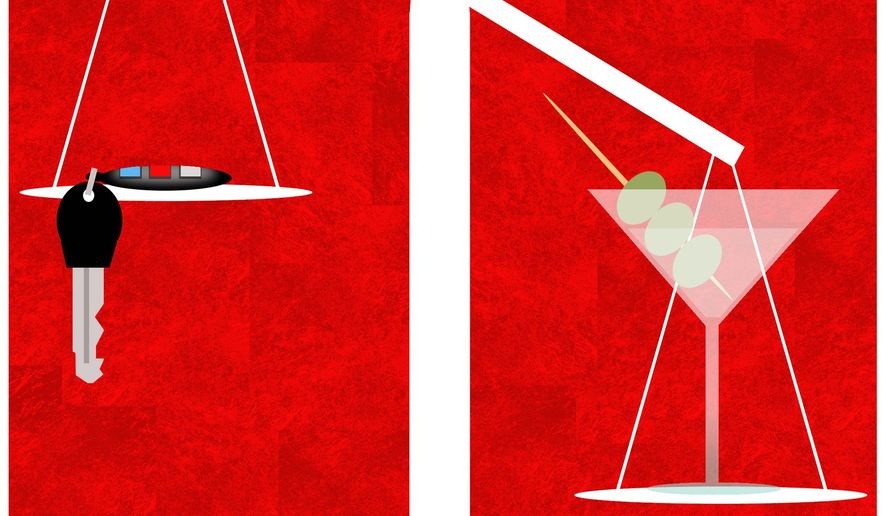OPINION:
As seen in the now $28 trillion national debt, the government is rarely a good steward of public resources.
Taxpayer dollars are frequently wasted and bureaucratic focus is misdirected. We’ve all experienced the defects firsthand at one point or another. Does a particularly frustrating moment at the DMV or post office ring a bell? As Johnny Carson commented, “[m]ail your packages early so the post office can lose them in time for Christmas.”
Although it doesn’t receive the level of attention that impressively slow lines at the DMV or government spending to build a “bridge to nowhere” does, alcohol is often a magnet for irrational legislating and misguided government action. Beer, wine and spirits are products that millions enjoy responsibly, but can be abused by the minority — leaving the door open for mischaracterization.
Look no further than the recently reintroduced HALT Drunk Driving Act, which aims to mandate alcohol detection devices be installed in all new vehicles nationwide as standard equipment. The goal to curtail drunk driving deaths is laudable, but subjecting a vast majority of American adults to flawed technology that stops an engine from starting is a problem waiting to happen.
The legislation in question will rely on infant technology to discreetly measure a driver’s blood alcohol concentration (BAC) via steering wheel sensors and other passive measuring devices. The federal government has already poured tens of millions of taxpayer dollars into the project and activists will inevitably jockey for even more. That price tag doesn’t even include the extra cost per vehicle the system will cost car manufacturers, an expense that will inevitably roll downhill to Americans at the auto dealership.
BAC levels must be accurate up to one one-thousandth of a percent, or three decimal places. Vehicle warning lights and ignition systems are far from being one hundred percent reliable. It’s not difficult to imagine intricate alcohol measuring devices going haywire. Especially when considering dramatic temperature shifts and constant road vibrations.
Even if the alcohol detection system is operating well at a “Six Sigma” standard — meaning devices are 99.99966 percent accurate — some sober want-to-be drivers would be left stranded in a parking lot, while dangerously impaired people could get behind the wheel and start their car. Applying the accuracy standard to the estimated 1.1 billion vehicle starts per day in the U.S., that’s more than 26,000 false readings per week.
Advanced alcohol detection systems are a worthwhile initiative to explore, but it’s clear the technology is not ready to take center stage. At the very least, the research shouldn’t continue to be funded on the taxpayer’s dime.
The ineffective use of resources isn’t reserved for lawmakers in Washington. State policymakers fall into the trap as well. A handful of states — most recently Hawaii — have considered lowering the legal BAC limit for driving from 0.08 to 0.05. The 40 percent reduction, a level at which someone can reach after consuming little more than a single drink, is a distraction from the real problem. The vast majority of alcohol-related traffic fatalities involve people with BAC levels exceeding three-times the proposed 0.05 arrest level.
Utah has been the only state to fall head-over-heels for the 0.05 policy. The unintended consequences have already appeared. The lives of people who would be considered responsible consumers in any other state are being destroyed over a glass of wine. And the negative consequences of the policy aren’t balanced out by a meaningful benefit. The latest government data reveals drunk driving deaths did fall in Utah after the lower legal limit was adopted, but alcohol-related traffic deaths fell in 30 other states during the same period. Some states experienced an even bigger decline than Utah.
Limited government resources (e.g. your money) should instead be allocated to bolster proven strategies that target product abusers without entangling responsible consumers. Officials should ensure that convicted DWI offenders who are court mandated to install a dashboard breathalyzer in their vehicle actually do so. More funding could also be appropriated for police departments to ramp-up saturation or roving patrols that actively remove dangerous drivers from the road.
Continuing to shovel millions, or even billions, of dollars into flawed or wasteful programs and initiatives is a hallmark of modern government, examples of which can be found on nearly every page of the government budget. The post office or DMV are only the poster boys of government mismanagement. Laws to maroon you in a parking lot or throw you in jail for enjoying a glass of your favorite beer, wine or cocktail prior to driving could be next.
• Richard Berman is president of Berman and Co. in Washington, D.C.




Please read our comment policy before commenting.